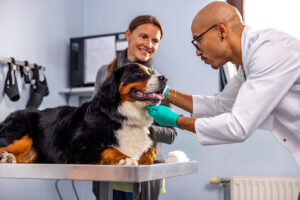
Knowing the steps to prepare your pet for surgery can ease your mind and also your pet’s.
When your beloved pet needs surgery, it can be a stressful time for both you and your furry friend. However, proper preparation can help ensure a smoother procedure and recovery. We have some essential preoperative care tips to help you get your pet ready for surgery.
Schedule a Pre-Surgery Vet Visit
Before the procedure, your veterinary surgeon will likely require a preoperative checkup to assess your pet’s health. This may include:
- Blood tests to evaluate organ function and detect any underlying conditions.
- X-rays or ultrasounds for a closer look at internal organs if needed.
- A thorough physical examination to ensure your pet is fit for anesthesia.
Follow Fasting Instructions
Most veterinary surgeries require your pet to fast for several hours before the procedure. This helps reduce the risk of vomiting and aspiration under anesthesia. Your vet will provide specific guidelines, but common recommendations include:
- No food for 8-12 hours before surgery.
- Limited water intake, usually up to a few hours before the procedure.
- Special exceptions for young, elderly, or diabetic pets who may need adjusted fasting times.
Adjust Medication Routine if Necessary
If your pet is on medication, consult your vet about whether they should continue taking it before surgery. Some medications may need to be paused, while others are safe to administer.
Prepare a Comfortable Recovery Space
After surgery, your pet will need a calm and quiet place to rest. Set up a cozy recovery area by:
- Providing a clean, soft bed with ample cushioning.
- Keeping food and water bowls easily accessible.
- Removing hazards that could cause accidental injury.
- Ensuring a warm, draft-free environment.
Reduce Stress and Anxiety
Surgery can be nerve-wracking for pets, so keeping them calm is essential. You can help by:
- Providing extra comfort and reassurance through gentle petting and a soothing voice.
- Using calming pheromone sprays or diffusers.
- Taking them for an easy walk before surgery to release nervous energy (if allowed).
Plan for Transportation
Ensure safe and comfortable transportation to and from the veterinary clinic. Use a secure pet carrier for small animals or a seatbelt harness for larger dogs. Bring a soft blanket to keep them warm and comfortable.
Follow Your Vet’s Instructions Carefully
Your veterinarian will provide detailed preoperative and postoperative instructions specific to your pet’s needs. Following these guidelines closely will help ensure a smooth surgery and recovery.
By taking these steps, you can help ease your pet’s anxiety and improve their chances of a successful surgery and recovery. Stay in close communication with your vet, and soon, your furry companion will be on the road to healing!
Trust Maryland Veterinary Surgical Services With Your Companion’s Health
Your companion’s health is important, and the team at MVSS is ready to provide the best care possible for your furry family. We are dedicated to combining comprehensive exams and assessments with informative and honest discussions of your companion’s care. Once we have worked with you to decide on the best course of action for your dog, our professionals will use their surgical expertise to work towards the goal of giving your companion an active and pain-free life. We are proud to serve loyal companions in Catonsville and Baltimore. To learn more about our services, give us a call at 410-788-4088 or visit us online. For more information and tips for dog health, follow us on Facebook and Pinterest.
